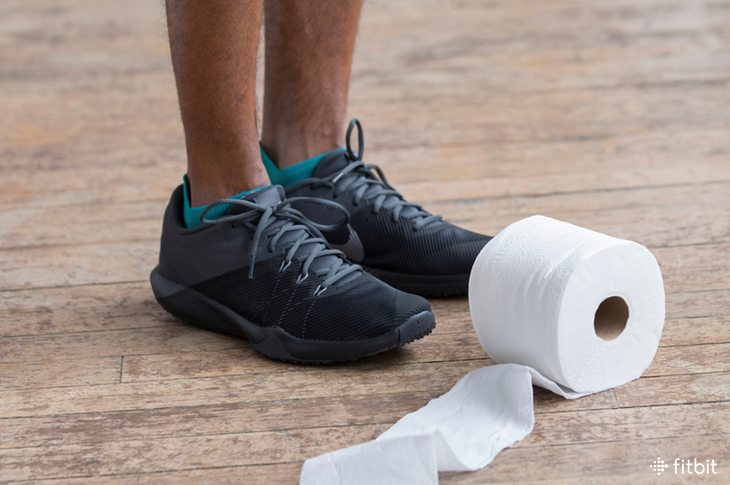If you’ve ever had to stop in the middle of a run, desperate to find a bathroom, or even considered diving for the nearest bush—welcome to the club. You’re most definitely not alone. Everybody poops. But runners tend to poop more easily. Research reveals that 30 to 90 percent of runners experience at least one symptom of gastrointestinal distress. For competitive athletes, it’s a running joke. But for weekend warriors, it can be mortifying. “The most common reason to stop running is the urge to defecate,” says Carrie Jaworksi, MD, Director of Primary Care Sports Medicine at NorthShore University Health System in Glenview, IL. “Many people are super embarrassed to talk about it, but it’s hard to reach your personal best when you’re stuck in a porta potty.” Here’s what you need to know when you need to go on the run.
Why Do You Have to Poop When You Run?
Jaworski explains that when you run, blood flow decreases to your gut, and increases to your muscles. The harder and longer the run, the more likely it’s going to mess with how well your gut is functioning. Diarrhea and rectal bleeding are common complaints across all endurance athletes, but almost twice as likely for runners. It could be that they’re pounding the road, adding up-and-down bouncing and vibrations. Hot weather and dehydration definitely don’t help. And of course, what you eat and drink makes a big difference: If you have a fatty breakfast sitting in your stomach, you’ve been swigging a lot of sugary sports drinks, or you’re even the slightest bit sensitive to dairy, that could spell tummy trouble during a run.
How to Avoid Emergency Bathroom Breaks
“The best thing you can do is train your gut,” says Kelly Pritchett, PhD, RDN, CSSD, assistant professor of sports nutrition at Central Washington University. “If you’re doing your first 5K, it could be as simple as nailing breakfast. But if you’re exercising for more than an hour, you need more fuel, so practice what you’re going to do during training, well before race day.” Here are a few nutrition tips to avoid the trots.
- Avoid foods high in fat and fiber. Fat takes longer to digest, so it can sit in your stomach, whereas fiber can clear you out a little too quickly. So you might want to limit whole grains, fruits, and vegetables a few days before a race, and definitely skip the bacon and cheese right before a run.
- Check sensitivities to lactose or FODMAPs. “Lots of runners are trying a diet that’s lower in FODMAPs these days,” says Pritchett, referring to foods that contain a particular type of sugar. It’s statistically more likely to be sensitive to FODMAPs than to gluten, so if you’re struggling with tummy troubles, talk to a dietitian. Lots of runners also dodge dairy. “If you have lactose intolerance or even a little bit of a sensitivity, running will likely exacerbate that,” Pritchett explains. “But there’s also no need to avoid dairy if it doesn’t cause you problems.”
- Don’t go crazy with caffeine. If a cup of joe sends you straight to the bathroom, that’s because caffeine stimulates the colon, and can increase bowel movements. A lot of athletes rely on caffeine for a performance boost. But Pritchett warns against overdoing it. Establish a caffeine routine, stick to your usual number of cups of coffee or caffeinated sports gels, and give yourself plenty of time in the morning to empty out.
- Dilute drinks and gels. Sugary sports drinks and gels can be harsh on your stomach, especially when they’re super concentrated. Pritchett recommends combining your fuel and hydration strategies, and cutting sports drinks with water or dissolving gels.
- Train your gut. The same way you train your legs, heart, and lungs, you want to treat your gut like an athletic organ. Even at shorter distances and lower intensities, Pritchett encourages runners to practice taking in a little bit of fuel. And above all, “Never try anything new, different, or crazy on race day,” Pritchett emphasizes. “Have a magic meal. Have a fueling strategy. Consistency is the best way to calm a rocky stomach.” And, of course, it never hurts to plan ahead and know where the porta potties will be placed along the course.
The post Why Do You Have to Poop When You Run? appeared first on Fitbit Blog.
Source: Fitbit Blog
—
